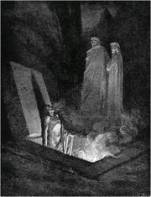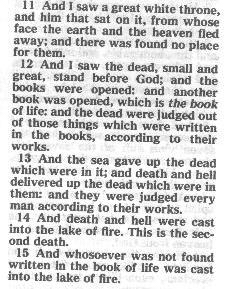|
from The Worldview Literacy Book copyright 2009 back to worldview theme(s) #14 |
| Discussion #14A: Imagine yourself as someone comfortable with a
"Moralistic God." You
believe that 1) Reality is ultimately composed of two substances, spirit
and matter (dualism of substance), and 2) when people die, their
spiritual essence, their soul, is judged by God.
You believe God gifted humans with free will and holds them
morally responsible for their behavior (see Discussion, worldview theme
#11B). You thus try to live
your life free of sin—that is you seek to avoid
offending God, breaking
His laws, and becoming alienated from Him.
You
recognize that even if the free will you seem to possess is just an
illusion and there really is such a thing as predestination, it would make
absolutely no difference in your behavior.
You reason that you should behave as if you have free will and
are in control—and if you aren’t, because you lack free will, then
there’s nothing you can do about it anyway!
You believe living as God wants you to live in today's world
guarantees you'll be spared eternal torment in the hereafter.
You don't want your soul to spend an eternity burning in
Hell—so your "fire insurance" is purchased by your good
behavior! You've been
impressed by the book of Revelation (see Figure #14a).
When God opens the book of life at the Last Judgment, you're
planning on His finding your name written in it—and avoiding being
"cast into a lake of fire."
Basically, you view Hell ( see Figure #14b) as where God, with
His perfect sense of justice, sends the souls of those people who cause
pain and suffering. It's reserved for those who do evil things.
It's really quite simple:
if evil is left unchecked and unpunished, not countered with strong
action, then more evil will result.
The existence of the fires of Hell is a deterrent: people's
knowledge that, if their behavior is evil, they'll suffer through eternity
there, deters lots of crime and bad behavior. (See Figure #42c.)
You recognize three complications to this simple picture:
1) Christians can repent of their sins, and escape
punishment after receiving the ultimate forgiveness: the redeeming of
their soul in the form of salvation.
2) Hell
may not be a physically real place: perhaps it is psychological state of
external suffering. Your
conscience has inflicted enough guilt on you for what may or may not
have been very minor transgressions: imagine what it would do it you
really did something bad!
Despite
the feelings, just shared, which connect to negatives and avoiding
punishment, you recognize there are related positive reinforcements that
also shape your behavior. Most
importantly these include 1) the peace of mind that your good behavior
provides, and 2) the promise of immortality—
your soul spending eternity in Heaven.
As for Heaven (Paradise, or whatever one calls it), you haven't
decided whether it's a real place or a psychological state—but lean
toward the former! |
Discussion #14B: While many in the West have embraced
reincarnation—ranging from Socrates, Plato, to New Age enthusiasts and
Scientologists (Figure #14c)—we consider this belief from an Eastern
perspective. Buddhists
imagine reincarnation occurs as one rides a Wheel of Life, symbolizing
change and rebirth. After
death, consciousness is reborn and emerges in a new form.
The particular form taken depends on past life circumstances and
karmic forces—which Hindus also believe in.
As their Bhagavad Gita
puts it, "Karma is the force of
creation, where from all things
have their life." A
"Law of Karma" cast as "Whatever you give to the world
you receive back from the world" inserts cosmic justice into reincarnation. Hindus believe the
soul (atman) is immortal and unchanging, and in reincarnation passes
into another body at death
(transmigration).
As the Bhagavad Gita summarizes it, "Never
was there a time when I did not exist, nor you, nor all these kings; nor
in the future shall any of us cease to be.
As the embodied soul continuously passes, in this body, from
boyhood to youth to old age, the soul similarly passes into another body
at death."
Whereas Hindus conceive of reincarnation as involving one's soul,
Buddhists describe something similar in terms of rebirth of
consciousness. Since its founding in the sixth century BCE, Buddhism sought
to distinguish itself from the older, surrounding Hindu tradition.
The Buddha denied that humans even have spiritual substance or
souls. His teaching of the
concept of transmigration—better termed rebirth in Buddhism—used the
analogy of a flame being passed from candle to candle, and stressed the
role of karma. Huston
Smith, in his classic The World's Religions, summarized it as
follows. "1) There is a chain of causation threading each life to
those that have led up to it, and to those that will follow.
Each life is in its present condition because of the way the
lives that led up to it were lived.
2) Throughout this causal sequence the will remains free
...People remain at liberty to shape their own destinies.
3) The two preceding points affirm the causal connectedness of
life, but they do not entail that a substance of some sort be
transmitted. Ideas,
impressions, feelings, streams of consciousness, present moments—these
are all we find, no spiritual substrate."
For both Buddhists and Hindus, the very lengthy rebirth and
transmigration cycle ends when the person has lost all desire (which
Buddhists connect with suffering) and is ready to spend eternity in a
state of oneness with the Reality known as Nirvana
(Moksha). Note, Nirvana is not God in a personal sense—but some make
that connection in a mystical sense.
There are other Eastern conceptions of reincarnation, including
an ancient one built on fatalism in which karma plays no role. Modern scientific investigations into claims (some
involving hypnosis) of those who remember past lives have been
inconclusive. |
|
Figure #14a The Last Judgment from the Bible's Book of Revelation |
Figure
#14b A Vision of Hell--painting by Gustave Doré, based
on Dante's Divine
Comedy 
Figure
#14c
|
